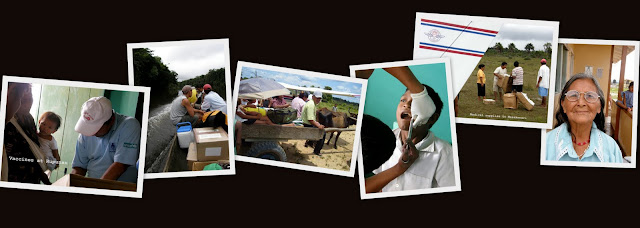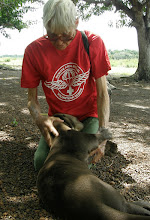Monday, December 14, 2009
The RPH initiative. RAM Guyana launching new collaborative project.
Rupununi Partnerships for Health’s goal is to expand HIV/AIDS services to interior communities by building indigenous capacity, strengthening partnerships, and expanding prevention efforts.
Project Summary:
HIV is recognized as a major threat to development in the Caribbean and around the world. As we collectively work to limit its impact, HIV can quickly threaten under-served areas. The interior regions of Guyana are some of the most rugged and difficult areas to work. Delivering health services is a particular challenge due to the scattered and mobile nature of the population. Increases in mining, logging and cross-border traffic pose further risks for disease transmission.
Much work has been done in areas of basic education on HIV and AIDS in the Rupununi (Region 9), but the time has come to dramatically scale up prevention, testing and coordination of services with the aim of universal access. The Hinterland Initiative is a critical opportunity at a time when threats are on the rise for this vulnerable population.
The plans and methods for the RPH will be built on the existing assets and robust partnerships that already produce results in Region 9. The idea is to combine the vital HIV/AIDS prevention, testing, and treatment activities together with existing and proven outreach programs. The high cost of transportation will be offset, allowing robust and diverse service delivery (dental care, eye care, TB testing, and blood sugar screening). HIV testing/counseling (VCT) and treatment would have far greater impact when held in concert with these critical activities.
Instead of an “AIDS Team” arriving in a village to offer a single service, a comprehensive “Health Team” would provide multiple services and generate a more enthusiastic and positive response.
At this time, we have the machinery in place to get moving. Not only do we have the mechanism of teamwork fostered by years of public-private partnership, but we also have a road-worthy Bedford army truck designed for just the inhibitive terrain that the Rupununi is famous for. Staffed with a team of volunteers, health workers and VCT personnel and equipped with a vibrant edutainment module, the objective of HIV prevention will be advanced.
RPH seeks not only to provide key services, but to set new standards in collaboration, information sharing and capacity building at the local and regional levels.
RAM Vets work to protect endagered sea turtles.
November 2009: A team of Remote Area Medical Veterinarians has recently completed a critical mission to the
Using innovative capturing systems and humane surgical technique, the team lead by Dr Bruce Langlois partnered with local residents and volunteers including the Peace Corps to conduct a week long spay and neuter clinic at Shell Beach.
An overpopulation of wild dogs has been seriously threatening the sea turtle population as their nests are routinely raided as a food source for hungry canines.
More details to follow….
In other RAM Vet news: Earlier in 2009 RAM Vets completed an extensive survey of the Rupununi horse population at the request of the Ministry of Agriculture. They screened hundreds of animals from scattered locations throughout the five subdistricts of Region 9 for Equine Infectious Anemia.
Friday, December 11, 2009
RAM's Cervical Cancer screening and treatment teams criss-cross the Rupununi, October 2009
 The RAM Women's Health Team once again returned to region 9 this time with three simultaneous mobile screening and treatment teams.
The RAM Women's Health Team once again returned to region 9 this time with three simultaneous mobile screening and treatment teams.The team pictured here was led by Jacqui Dorran and served the North Rupununi after completing a series of major GYN Surgeries at the St Joseph Mercy Hospital in Georgetown.
For the first time, an HIV counseling and testing service was added to a RAM W.H. Team - in this case holding two co-located clinics in the Deep South of Region 9. This was made possible through our Partnership with Youth Challenge Guyana.
RAM has been working with the Ministry of Health and all stakeholders to save lives and address the cervical cancer issue affecting so many families throughout Guyana since 2003.
+cropped+2.jpg)














